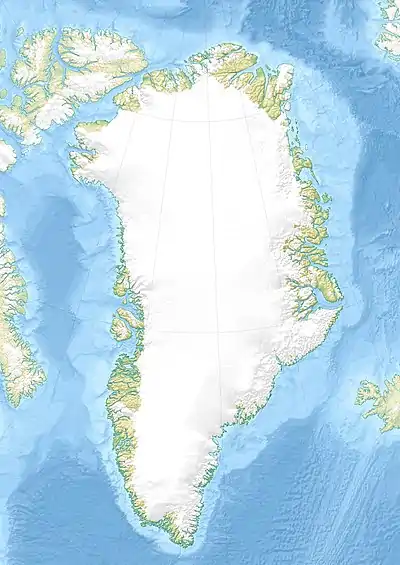| Steensby Glacier | |
|---|---|
| Steensby Gletscher | |
 | |
 Location within Greenland | |
| Type | Tidal outlet glacier |
| Location | Greenland |
| Coordinates | 81°27′N 53°0′W / 81.450°N 53.000°W |
| Area | 4,700 km2 (1,800 sq mi) |
| Length | 60 km (37 mi) |
| Width | 4.8 km (3.0 mi) |
| Thickness | 75 m (246 ft) - 105 m (344 ft) |
| Terminus | Saint George Fjord; Lincoln Sea |
Steensby Glacier (Danish: Steensby Gletscher) is a major glacier in northern Greenland.[1]
This glacier was first mapped in 1917 during Knud Rasmussen's 1916–1918 Second Thule Expedition to north Greenland and was named after Danish ethnologist Hans Peder Steensby.
Geography
The Steensby Glacier originates in the Greenland Ice Sheet. It is roughly north–south oriented and has its terminus between Nyeboe Land and Warming Land at the head of the Saint George Fjord. The fjord is free from ice in the summer, and the glacier forms a floating tongue within the fjord that has shrunk since it was measured in 1963.[2][3]
 Map of part of Ellesmere Island and far Northern Greenland. |
Bibliography
See also
References
- ↑
- ↑ The Terminal Disintegration of Steensby Gletscher, North Greenland
- ↑ U.S. Geological Survey Professional Paper, Volume 1386, Part 3, figure 37
External links
This article is issued from Wikipedia. The text is licensed under Creative Commons - Attribution - Sharealike. Additional terms may apply for the media files.